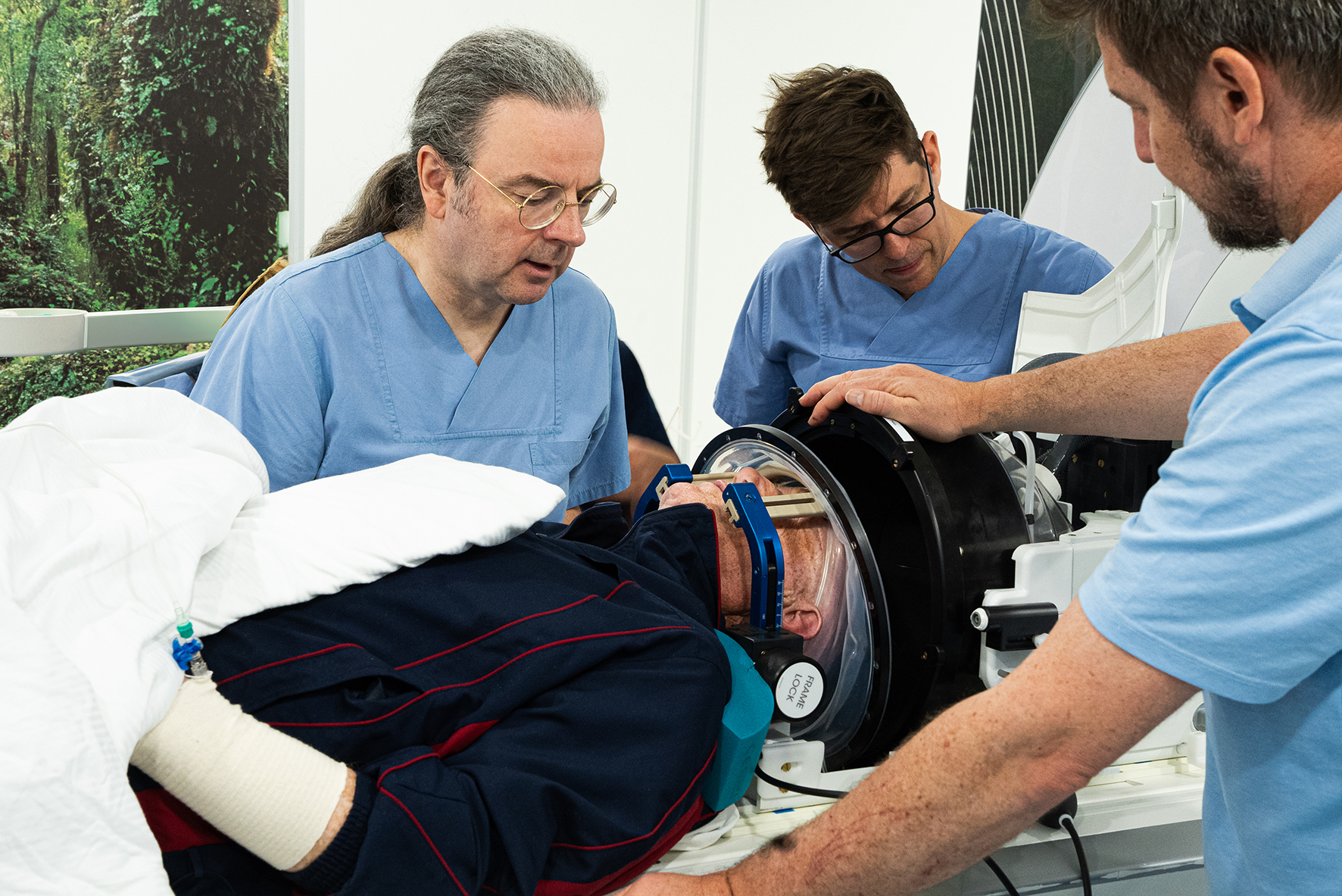Ultrasound treatment helps immediately against severe tremors
Non-invasive ultrasound therapy brings tremor patients lasting improvement in their symptoms / Unique in southern Germany / Therapy can also be used for Parkinson's disease and neuropathic pain

Holding a cup of hot coffee in your hand without trembling - a moment that means a new lease of life for many tremor patients. The University Medical Center Freiburg now has a new, gentle treatment option for essential tremor: for the first time in southern Germany, a therapy is possible here that intervenes specifically in the brain - without surgery, without opening the head, without an incision, without an implant. Focused ultrasound (HiFUS) can be used to treat specific areas of the brain with millimetre precision and thus eliminate tremors - safely, precisely and with a short recovery time. The therapy is also approved for Parkinson's disease and neuropathic pain.
"With the new system, we can offer tremor patients a safe, gentle and long-term effective therapy for which surgery is not an option," says Prof. Dr. Volker A. Coenen, Head of the Department of Stereotactic Neurosurgery at the Department of Neurosurgery at the Freiburg University Medical Center. "The effect is immediate and after treatment, patients can drink, eat or write again without trembling, which was often almost impossible. This allows those affected to lead a normal life again."
What is a tremor?
A tremor is a form of movement disorder in which involuntary shaking occurs - most commonly in the hands or arms, less frequently in the head or trunk. In Germany, around one in 100 people is affected by so-called essential tremor - a tremor without a recognizable neurological cause. This form often runs in families and increases when muscles are actively tensed, for example when writing or drinking. In Parkinson's patients with tremor, it is usually the other way around: the tremor tends to decrease with targeted movements.
Common in the USA, pioneering work in Germany
HiFUS has been used successfully in the USA for around ten years. However, its availability in Germany has been severely limited to date. "The main reason for this was the lack of billing options via health insurance companies. This problem has now finally been solved. There is no doubt about its effectiveness," explains Coenen, adding: "We are delighted to be able to offer the therapy. And we have also seen that many patients really want this therapy."
Precise treatment without an incision - a new option for severely affected patients
The painless HiFUS treatment is performed entirely without incisions or implants: Patients lie in a magnetic resonance imaging (MRI) scanner during the procedure, which is used to monitor the treatment in real time. Using a special helmet, over 1,000 ultrasound beams are bundled and directed precisely at an area of the thalamus, which serves as an important conduction station for the tremor signals in the brain. The heat generated deactivates the overactive nerve cells in a targeted manner without damaging surrounding tissue.
"Patients are awake during the entire HiFUS treatment and experience the effect on their tremor directly. This is a very special moment for patients and practitioners alike," explains neurosurgeon Dr. Bastian Sajonz, senior physician at the Department of Stereotactic Neurosurgery at the Freiburg University Medical Center. The method is particularly suitable for patients who do not respond sufficiently to medication or do not want deep brain stimulation.
Fast and lasting recovery
The new HiFUS therapy not only impresses with its precision, but also with its short recovery time and low risk of complications. The latest generation ultrasound device also enables improved visualization of the target region in the brain and an optimized workflow for the treatment team. This means that work can be carried out even more precisely and the procedure takes less time.
"Many patients can leave hospital after just a few days and quickly return to their everyday lives," says Sajonz. International studies have shown a sustained improvement in symptoms over several years. HiFUS treatment in Freiburg is part of routine clinical care; costs are covered by health insurance companies.
Further information: www.uniklinik-freiburg.de/stereotaxie
Contact hifus@uniklinik-freiburg.de
Caption 1: Prof. Coenen (left) and Dr. Sajonz (center) check the correct positioning of the patient one last time before the focused ultrasound treatment begins.
Caption 2: The focused ultrasound therapy is carried out using a special helmet with more than 1,000 high-precision ultrasound transmitters and is monitored live in the magnetic resonance tomograph.
Caption 3: The HIFUS therapy is prepared and supervised as a team (from left to right): Prof. Dr. Volker A. Coenen, Head of the Department of Stereotactic Neurosurgery, Dr. Bastian Sajonz, Senior Physician in the same department, Prof. Dr. Michel Rijntjes, Senior Physician at the Department of Neurology and Neurophysiology, Prof. Dr. HorstUrbach, Medical Director of the Department of Neuroradiology
Image source: University Medical Center Freiburg
Back
Medical Center - University of Freiburg
Central Information
Phone: 0761 270-0
info@uniklinik-freiburg.de
For press inquiries:
Corporate Communications
Breisacher Straße 153
79110 Freiburg
Phone: 0761 270-84830
kommunikation@uniklinik-freiburg.de




